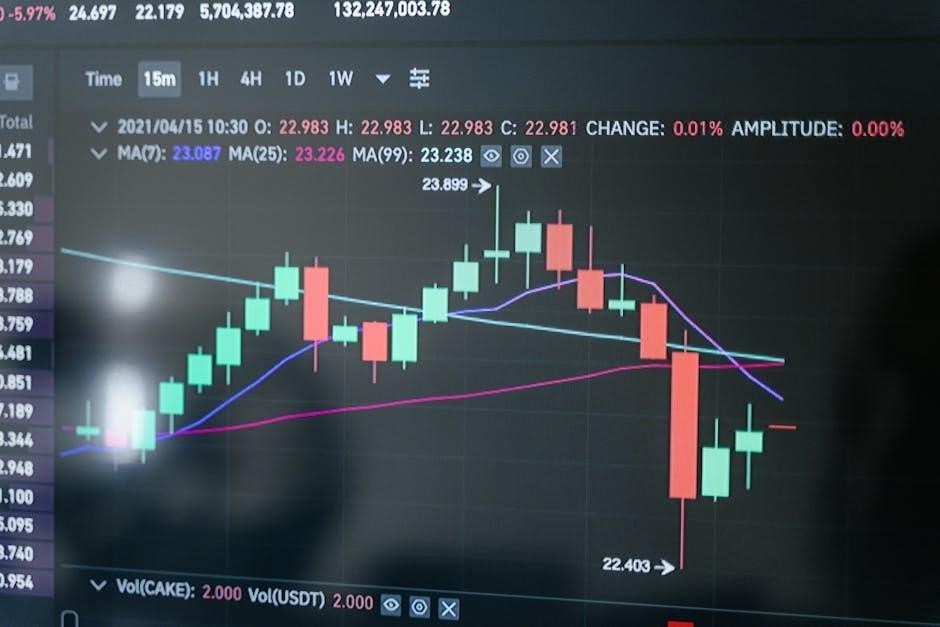trading in a zone pdf
Trading in the Zone, by Mark Douglas, explores the mental state required for peak trading performance․ It teaches traders to enter “the Zone,” a state of optimal focus and intuition, where decisions are made effortlessly without emotional interference․ This concept is central to overcoming psychological barriers and achieving consistent success in the markets․ The book emphasizes the importance of probability thinking, surrendering to market dynamics, and developing a disciplined mindset․ It serves as a comprehensive guide for traders seeking to master their mental game and unlock their full potential․
Overview of Mark Douglas and His Contributions to Trading Psychology
Mark Douglas, a renowned trading psychologist and author, has significantly influenced the field of trading through his work․ His book, Trading in the Zone, is considered a landmark in understanding the mental dynamics of successful trading․ Douglas emphasizes the importance of probability thinking, surrendering to market dynamics, and overcoming psychological barriers․ He founded Trading Behavior Dynamics, Inc․, aimed at helping traders develop the mindset needed for consistent success․ His teachings focus on breaking down limiting beliefs and cultivating a professional trader’s mindset, making him a key figure in the realm of trading psychology․ His insights have empowered countless traders to achieve greater discipline and intuition in their decision-making processes․

The Concept of “The Zone” and Its Importance in Trading

The concept of “The Zone,” as introduced by Mark Douglas, refers to a mental state where traders operate with optimal focus, clarity, and intuition․ In this state, decision-making becomes effortless, and traders are fully aligned with market dynamics, free from emotional interference․ Achieving “The Zone” is crucial because it allows traders to execute strategies without hesitation or fear, leading to consistent and profitable outcomes․ Douglas emphasizes that entering “The Zone” requires overcoming psychological barriers, such as fear and doubt, and adopting a mindset rooted in probability thinking and acceptance of market uncertainty․ This mental transformation enables traders to perform at their best, making it a cornerstone of successful trading psychology․

Key Principles of Trading in the Zone

Key principles include embracing probability thinking, overcoming psychological barriers, and maintaining mental discipline․ These elements help traders achieve consistency and success by aligning with market dynamics․

The Role of Probability Thinking in Successful Trading
Probability thinking is a cornerstone of successful trading, as it allows traders to make decisions based on likelihood rather than certainty․ Mark Douglas emphasizes that traders must embrace the uncertainty of markets and focus on high-probability setups․ By thinking in terms of probabilities, traders can avoid the trap of needing to be right and instead adapt to the fluid nature of market dynamics․ This mindset shifts the focus from predicting outcomes to executing trades based on favorable odds, fostering consistency and reducing emotional interference․ Probability thinking also helps traders manage risk effectively and maintain discipline, which are essential for long-term success in the markets․
Understanding Support and Resistance Levels in Market Dynamics
Support and resistance levels are pivotal in understanding market dynamics, representing areas where price may encounter buying or selling pressure․ Support is a price level where buyers tend to enter the market, preventing further decline, while resistance is where sellers often intervene, capping upward movement․ These levels are not fixed and evolve based on market conditions․ Traders use them to identify potential turning points, gauge market sentiment, and execute trades with higher probability․ By analyzing support and resistance, traders can better anticipate market behavior, making informed decisions aligned with the flow of price action․ This concept is integral to developing a strategic approach and staying aligned with market dynamics․
The Psychological Barriers Traders Must Overcome
Traders face numerous psychological barriers that hinder their success, such as fear, greed, and emotional attachment to trades․ These mental obstacles often stem from a desire to control outcomes and an aversion to uncertainty․ Many traders struggle with impulsive decisions, overtrading, and the inability to accept losses․ Additionally, the fear of missing out (FOMO) and overconfidence can lead to poor judgment․ To overcome these barriers, traders must cultivate self-awareness, discipline, and a mindset focused on probability rather than certainty․ By letting go of the need to control the market and embracing the unpredictability of trading, traders can operate more effectively within “the Zone․” This mental transformation is essential for achieving consistency and long-term success in trading․

Mental Discipline and Mindset
Developing mental discipline and the right mindset is crucial for traders to stay focused, think probabilistically, and execute decisions without emotional interference, as emphasized in “Trading in the Zone․”
Developing the Mindset of a Professional Trader
Developing the mindset of a professional trader involves cultivating emotional detachment, consistency, and discipline․ Traders must embrace probability thinking, understanding that no strategy guarantees success․ They should focus on executing plans without emotional attachment to outcomes․ Surrendering to the market’s dynamics is key, as is accepting losses as part of the process․ A professional trader maintains a disciplined approach, adhering to predefined rules and avoiding impulsive decisions․ This mindset allows traders to stay focused, even in volatile markets, and continuously improve their strategies․ By internalizing these principles, traders can achieve a mental state where decisions align with market realities, fostering long-term success․
How to Achieve Optimal Focus and Concentration

Achieving optimal focus and concentration in trading requires a disciplined mental approach․ Traders must cultivate mindfulness to clear their minds of distractions and emotional biases․ Techniques such as meditation and controlled breathing can help maintain a calm and focused state․ Minimizing external distractions by creating a quiet, organized workspace is essential․ Additionally, traders should set clear goals and priorities to stay aligned with their trading plan․ Emotional detachment from outcomes is crucial, as it prevents impulsive decisions․ By developing a pre-trade routine and staying fully present in the moment, traders can enhance their ability to concentrate and make rational decisions․ Regular mental practice and review of past trades further refine focus, leading to improved performance․
The Importance of Self-Discipline in Trading Decisions
Self-discipline is the cornerstone of successful trading, enabling traders to adhere to their strategies and avoid impulsive decisions․ It requires controlling emotions, such as fear and greed, to stay aligned with predefined trading plans․ Traders must discipline themselves to execute trades only when conditions meet their criteria, avoiding overtrading or revenge trading․ Self-discipline also involves accepting losses as part of the process and not allowing ego to interfere with rational decision-making․ By maintaining mental and emotional control, traders can consistently apply their skills and knowledge, leading to improved performance and long-term success in the markets․ Self-discipline is the bridge between strategy and execution, ensuring traders act logically rather than emotionally․

Practical Strategies for Traders
Practical strategies for traders include mastering probability thinking, managing emotions, and maintaining discipline․ These techniques help traders stay focused, avoid common pitfalls, and achieve consistent success in the markets․
Learning to Think in Terms of Probabilities
Learning to think in terms of probabilities is a cornerstone of successful trading, as emphasized in Mark Douglas’s Trading in the Zone․ Traders must shift from seeking certainty to understanding the likelihood of market outcomes․ This mindset allows them to make decisions based on statistical edges rather than emotional reactions․ By focusing on probabilities, traders can better manage risk, capitalize on opportunities, and avoid overconfidence or fear․ This approach also fosters discipline, as traders learn to trust their strategies and execute trades consistently․ Mastering probability thinking is essential for achieving long-term success in the markets and staying aligned with the natural flow of market dynamics․
Mastering the Art of Surrendering to the Market
Mastering the art of surrendering to the market is a critical concept in Trading in the Zone․ It involves letting go of emotional attachments to specific outcomes and instead embracing the natural flow of market dynamics․ Traders must surrender their ego, biases, and need for control, allowing the market to guide their decisions․ This mindset enables traders to execute trades without hesitation and avoid common psychological traps like overconfidence or fear․ Surrendering also means accepting that no single trade defines success or failure, fostering a detachment that promotes consistent execution of the trading plan․ By surrendering, traders align themselves with the market’s inherent unpredictability, achieving a state of mental clarity and focus essential for peak performance․
Strategies for Avoiding Common Psychological Traps
Avoiding psychological traps is essential for achieving consistency in trading․ Traders must understand that markets are governed by probabilities, not certainties, which helps reduce fear and greed․ Developing a well-defined trading plan and adhering to it strictly eliminates impulsive decisions․ Cultivating self-awareness allows traders to recognize emotional interference and pause when necessary․ Accepting losses as an inevitable part of the process fosters resilience and maintains discipline․ By mastering these strategies, traders can operate effectively within the “Zone,” making decisions based on logic rather than emotion, and ultimately achieving long-term success in their trading journey․
Trading in the Zone emphasizes that success lies in mastering one’s mindset․ By embracing probability thinking and letting go of emotional interference, traders can achieve consistent results and mental clarity, ultimately unlocking their full trading potential․
Summarizing the Core Ideas of Trading in the Zone
Mark Douglas’s Trading in the Zone focuses on the mental and psychological aspects of trading, emphasizing the importance of entering “the Zone,” a state of optimal focus and intuition․ The book highlights how traders must adopt a mindset rooted in probability thinking, letting go of emotional attachment to outcomes․ It stresses overcoming psychological barriers, such as fear and greed, by cultivating self-discipline and a deep understanding of market dynamics․ Douglas argues that success in trading is not about predicting the future but about aligning with the present moment and surrendering to the market’s natural flow․ By internalizing these principles, traders can achieve consistency and confidence, unlocking their full potential in the markets․
Final Thoughts on Achieving Success in Trading
Mark Douglas’s Trading in the Zone underscores that achieving success in trading requires a profound shift in mindset and unwavering discipline․ Traders must embrace the idea that consistent profitability stems from aligning with the market’s natural flow rather than trying to control or predict it․ Douglas emphasizes that true mastery lies in surrendering emotional biases and adopting a probabilistic view of market behavior․ By cultivating self-awareness and overcoming psychological barriers, traders can develop the resilience and focus needed to thrive in the markets․ Ultimately, success in trading is not about being right but about making disciplined, high-probability decisions consistently․ Douglas’s insights challenge traders to rethink their approach and commit to continuous growth, both as traders and as individuals․


